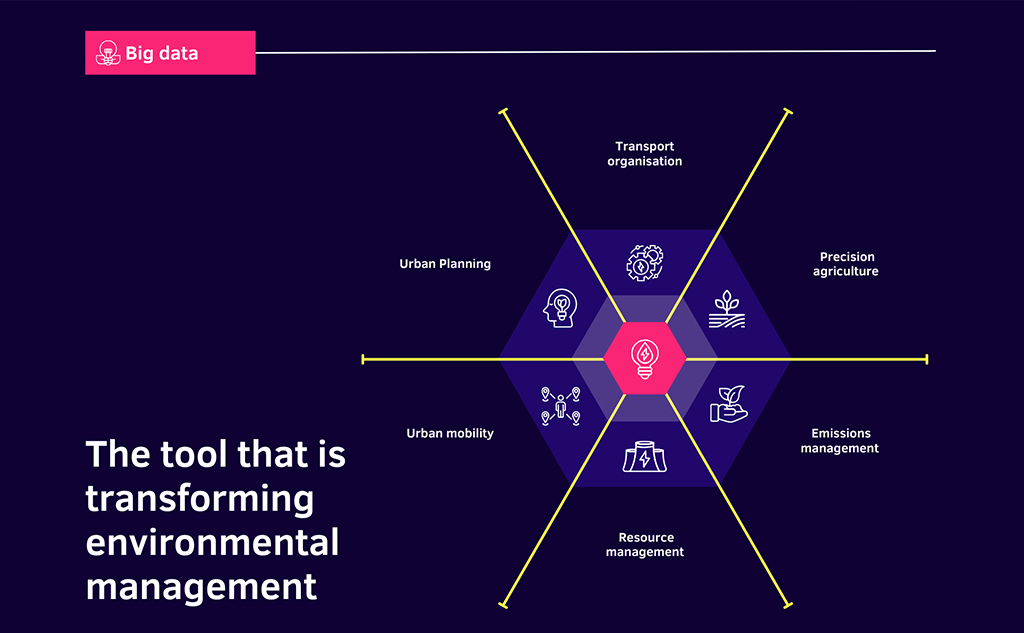Better air, water and soil and soil quality;, improved agricultural and industrial yields , without harming the environment; optimised management of wastes and water, and energy based on demand: Big Data offers limitless potential.
Every activity generates vast amounts of data. This data – whose importance was once overlooked – is now seen as crucial. Companies, manufacturers, farmers or even local authorities can all benefit from the quality and analysis this enormous data set has to offer in order to improve their impact on the environment and preserve natural ecosystems. Learn more about an essential tool for companies wishing to be “greener”.
The basics of Big Data
Big Data refers to all data whose volume, velocity and variety demand capabilities in storage, processing and analysis not offered by traditional tools.
This digital data can be generated by satellite applications or GPS signals but also by social media usage, online streaming, web searches or online shopping.
The information gathered is held in IT infrastructure referred to as “data centres” (or “green data centres” for more environmentally-friendly installations). Rich and varied, this data is used across a range of sectors including marketing, health, agriculture and the environment, amongst others.
In the era of sustainable development, it has become a valuable information source for companies (as part of Corporate Social Responsibility, or CSR, for example); manufacturers, farmers; or local authorities wishing to minimise their environmental impact.
A revolution in environmental decision-making
The emergence of Big Data has fundamentally overturned decision-making processes. Thanks to sophisticated analysis of the wide range of data collected, and to the predictive models now available, businesses- such as farmers or manufacturers- or local authorities can make informed decisions to improve their environmental impact and profitability.
Some specific applications of Big Data:
For companies, manufacturers and farmers
- Management of demand: data related to historical sales, for example, allows trends to be predicted and procurement from suppliers to be adjusted.
- Organisation of transport: improved logistics visibility facilitates more sustainable planning of the flow of goods.
- Management of greenhouse gas emissions: companies are able to identify potential sources of emissions and find solutions to reduce them.
- Better management of resources: information relating to resource usage helps minimise wastage of water, electricity or raw materials.
- Precision agriculture: data related to soil quality, weather or seasonal forecasting enables the effective and calculated application of inputs and water resources, or may recommend optimal times at which to plant and harvest. Yields are improved and the environmental impact of agriculture is minimised.
For local authorities
- Urban planning: sophisticated analysis of data (environmental, geospatial, demographic, etc.) allows the impacts of urbanisation on the environment to be assessed and guidance to be given on architectural choices, optimisation of land use, management of transport or the layout of public spaces. This supports the preservation of natural areas and the quality of air or water, for example.
- Civic engagement: information gathered from citizens may facilitate the implementation of actions encouraging community participation in these environmental projects.
- Urban mobility: real-time transport data and traffic modelling stimulate the effective management of mobility in towns and cities and also promotes the reduction of greenhouse emissions.
- Real-time monitoring: authorities are able to identify pollution of soils, the air or water in real-time, so can rapidly provide solutions to preserve biodiversity and the population’s health.
For each of these actors, digital data also offers key information for the implementation of sustainable waste management or of responsible water and energy resources utilisation.
The cities leading the way
Barcelona is one of the first “green” cities to use data to reduce its environmental impact. Amongst the technology applications drawn upon: the real-time adjustment and optimisation of refuse trucks through sensors that monitor the fill level of waste bins.
In Singapore, another type of sensor also provides valuable data. As a result, water leaks, pollution overflows, or energy losses are detected immediately, allowing the relevant departments to rapidly deploy solutions.
Toward more sustainable environmental management
Precise environmental monitoring, risk prediction, impact assessment, the identification of models or trends, the role of in-depth data analysis; all are fundamental to the development of effective responsible and sustainable policies.
In the face of ecological urgency, a number of digital data-based initiatives are emerging. In order to maximise the use of this data and act for a greener future, it is essential that companies and other agents of change collaborate with data experts and specialist environmental protection organisations.




